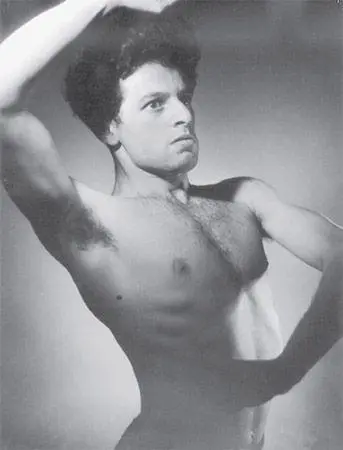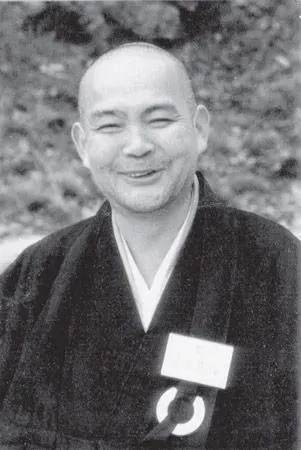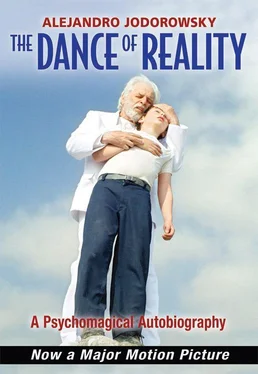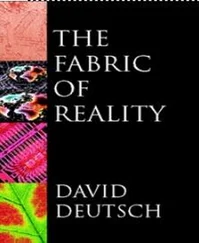
Performing in a pantomime (Santiago de Chile, 1950). (Was I a precursor to Iggy Pop?)
Fromm received us in a beautiful bungalow with bougainvillea-covered walls. He had white hair and gentle blue eyes, a voice free of aggression, often quoting the Torah to affirm his atheism, and wore white pants and a light blue jacket so brightly colored that it gave him the appearance of an orchestral musician in the style of Tommy Dorsey. This kind Jewish man seemed to bear no resemblance to the stern father image that he projected to his Mexican students. As his wife served an appetizer, Fromm asked me to describe the techniques of pantomime, especially those related to the expression of weight. “The man who has not realized his freedom, that is to say who has not cut his incestuous ties to his mother and the ties connecting him to his family and his homeland, experiences all these as a burden without knowing that he carries that weight,” he said to me. As our conversation continued, Fromm suggested that we go to lunch at a restaurant on one of the hills on the outskirts of Cuernavaca. “I will go by car with the mime,” he announced to his students. “My heart does not allow me to take the pleasure of that delightful climb. But I advise you to go on foot, in complete harmony with nature and one another. All love is based on knowledge of the other; all knowledge of the other is based on shared experience.” When we arrived at the restaurant Fromm asked for a jug of tamarind water and said to me with a blissful smile, “Let’s drink this healthy liquid in tranquillity. My collaborators, talking to each other and enjoying the beautiful scenery, will take at least an hour to get here.”
The master was wrong: his disciples arrived in less than twenty minutes, perspiring, pale, and short of breath. One of them fell down half-conscious in a chair, another vomited, and the others ran to the cold drinks, imbibing them in large and desperate gulps. After a short time, ashamed, they confessed their mistake. They had started out completely calm on the road that led to the mountain restaurant. By common agreement, in order to better commune with Mother Nature, they had decided to march in silence. After a few minutes, they had noticed that the two Colombians, subtly speeding up their pace, were walking ten meters ahead. The rest of them hurried to catch up. A competition of long strides began, each one trying to prove that he was stronger than the other. This degenerated into a race. The last hundred meters were taken at a sprint, leaving them almost totally exhausted. Fromm burst into laughter, tinged with sadness and compassion. He said, “The beginning of freedom lies in the capacity of man to suffer. And man suffers if he is oppressed, physically or spiritually. Suffering moves him to act against his oppressor, seeking to end the oppression rather than seek a freedom of which he knows nothing. Your greatest oppressor, my friends, is the individual ‘I.’ No therapist can cure it on your behalf. Remember what Hindu medicine tells us: the physician prescribes, God heals. It seems essential that you continue meditating with the Zen monk.” I was surprised, a Zen monk in Mexico? I had not heard any news of it. I knew that Erich Fromm had invited Daisetz Teitaro Suzuki to Mexico and had published a book with him, Zen Buddhism and Psychoanalysis, but I was excited to hear of the existence of this monk, whose name was Ejo Takata. I had read every book on the topic that I could get my hands on, but direct contact with a Zen master bore more weight than a ton of printed pages.
On the return bus trip, I asked them where I could find the monk. Some minutes of embarrassed silence passed before they answered me: “It’s a secret. Apart from us, no one knows he is here. We cannot communicate his address. The only one who can give an answer is Dr. F., our treasurer.” Dr. F received me in his large office and said, “Ejo Takata works exclusively for us. We have built a small zendo on the outskirts of the city. If you wish to go there to meditate with us every day at six o’clock (except for Saturdays and Sundays, of course), you must first offer a donation, for example. ” (and without finishing the sentence, he wrote a large sum on a piece of paper. It may not have been so large for him, but for me, it was equal to all my savings.) Without a second of doubt, I signed a check. He gave me a card with Ejo Takata’s address and a map showing how to get there.
At six o’clock the next morning I walked on a path alongside a ravine, the bottom of which was filled with garbage and rats, and came to a modest one-story house surrounded by a garden. With my heart pounding fast, I gave a few timid knocks on the door. It was instantly opened by a Japanese man in monastic clothes: he had a shaven head, a face of indefinable age, a smile showing teeth mounted on steel frames, and small bright eyes. He gave a bow then embraced me with affection as if he had known me for years. He led me to the small meditation room and showed me a box of red cloth with a white circle in the center containing a Japanese word. He translated: “Happiness.” How could I have realized that in that moment, Ejo Takata had transmitted the essence of Zen to me? He searched my face and saw that I had not understood the message. He clicked his tongue a few times, tilting his head from one side to the other. In his Japanese accent he muttered, “Need much zazen.” He handed me a black cushion — a zafu — showed me how to place it under my buttocks and meditate on my knees, corrected the position of my hands and my spine, and sat to meditate in front of me, as still as a wax sculpture. Half an hour passed. My legs hurt atrociously. The psychiatrists began to arrive. Without apologizing for the delay they sat down and, with profound and extraordinary concentration, remained still for an hour and a half. Then, smiling, they made quick bows and left. My body was numb, and I could barely walk. For three months I suffered martyrdom, all my muscles and joints hurt, my legs fell asleep, and my neck sunk into my back, making me feel like a sick turtle. Ejo would give me hard blows on the shoulder blades with his wooden cane to make me regain energy. The doctors, by contrast, were always smiling and could spend hours without moving. Once I conquered the bodily aches, I had difficulties with my mind. Because sitting still was excruciatingly boring, I started imagining poems, stories, sensual images, solutions to all kinds of problems. But I realized that it was foolish to seek the Master’s admiration by imitating the appearance of a Buddha: I had to overcome my mental chaos. I realized that at every moment my mind was invaded by endless dialogues, monologues, judgments, and images that, by giving them names, I compared to other images. I called this “mental chatter.” I started trying not to let words into my mind. I struggled for three years until I was finally able to keep my mind empty of words whenever I wanted to. I was very glad of this victory. However, I realized that in order to keep language out of my mind I had to devote my attention to doing so, making a continuous effort. This is not the correct way to stop the internal dialogue. What I had to do was to stop identifying myself with my thoughts. They were mine, but they were not me. As I meditated, I let the words go through my mind like clouds blown by the wind. The phrases came, nobody would take control of them, they would leave. I arrived at the zendo one misty morning ready to start this new struggle. I found Ejo carrying his few possessions in a cloth sack.

Читать дальше














